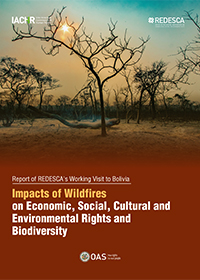- English
- Español

Press Release
REDESCA publishes report on wildfires in Bolivia and calls for urgent action to address impacts on human rights and ecosystems
July 17, 2025
Contact info
Special Rapporteurship on Economic, Social, Cultural, and Environmental Rights
Distribution List
Washington, DC—The Office of the Special Rapporteur on Economic, Social, Cultural, and Environmental Rights (REDESCA) of the Inter-American Commission on Human Rights (IACHR) today published the report "Impacts of Forest Fires on Economic, Social, Cultural, and Environmental Rights and Biodiversity", prepared from its working visit to the Plurinational State of Bolivia between December 9 and 11, 2024.
During the mission, led by Special Rapporteur Javier Palummo Lantes, the delegation visited La Paz, Santa Cruz de la Sierra and San Ignacio de Velasco, including a flyover of the Chiquitania region, to document the impacts of forest fires on human rights, particularly on rural and indigenous communities.
The report documents a growing trend of forest fires in the last two decades, with widespread damage to nature, territories and populations. In 2024, Bolivia faced an emergency of unprecedented magnitude, with more than 10 million hectares affected, which generated a devastating impact on strategic ecosystems and livelihoods. According to official information, the most affected departments were Beni, Cochabamba, Chuquisaca, La Paz, Pando and especially Santa Cruz, where the fire destroyed approximately 7.3 million hectares, which represents about 65% of the total area affected. These fires involved significant environmental and socioeconomic losses, affecting communities, their livelihoods, and the ecosystems on which they depend.
The report analyzes impacts on a wide range of rights, including access to water, health, food, housing, education, work, and cultural rights, underscoring how structural inequalities already faced by indigenous peoples, peasant communities, women, the elderly, and those living in poverty deepened.
The report highlights the urgency of adopting a National Integrated Fire Management Plan with an ecosystemic, preventive and intercultural approach, which articulates scientific knowledge and traditional knowledge. It also calls for removing regulatory and economic incentives for land-use change and deforestation, ensuring environmental and social impact assessments, and requiring climate, environmental, and human rights due diligence from companies operating in high-impact sectors. In addition, the report points out that fire management requires integrating traditional knowledge, improving control and guaranteeing participation and access to information, all with a preventive, intercultural and rights-based approach.
REDESCA appreciates the efforts made by the Bolivian State in responding to the emergency, including the actions of the different levels of government, community brigades and international cooperation. However, it stresses that structural prevention, ecological restoration and climate action with a human rights approach are key to avoiding new crises of this magnitude.
Considering the transboundary nature of fires and their regional effects, the Rapporteurship emphasizes the need to move towards regional environmental governance mechanisms, in line with inter-American standards and other multilateral instruments on climate change, health, disasters, and human rights.
REDESCA is grateful to the Plurinational State of Bolivia for its openness and cooperation during the visit and the preparation of the report, in particular to the Ministry of Foreign Affairs and the Permanent Mission to the OAS, as well as to authorities at all levels, indigenous leaders, rural communities, environmental and nature defenders, community brigades, civil society, and international cooperation, whose contributions were essential.
The Office of the Rapporteur also reiterates its readiness to provide technical assistance, including the possible activation of a follow-up mechanism to support the implementation of the recommendations and strengthen the protection of human rights in the face of the climate emergency.
The Office of the Special Rapporteur on Economic, Social, Cultural, and Environmental Rights is a rapporteurship created by the IACHR with the objective of strengthening the promotion and protection of economic, social, cultural, and environmental rights in the Americas, leading the Commission's efforts in this area.
No. RD143/25
12:00 PM


